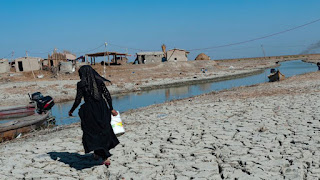Iraq is adopting measures to reduce water scarcity effects on lands in Dhi Qar
The Marsh Revival centre at the ministry reportedly said that the low-lying lands of Dhi Qar have been suffering from
water scarcity for the past three seasons. The centre further revealed that the “marches have paid the price for the consequences of water scarcity.” The marshes in Dhi Qar were affected because of water scarcity. It also cut the size of agricultural plans in half.
Reportedly, the Ministry of Water Resources in Iraq continues to put efforts to reduce the effects of water scarcity. According to the statement, the problem occurred because of a decline in rainfall, and also reduced water flows from neighbouring Turkey across the Tigris and Euphrates rivers to Iraq.
Reportedly, the Marsh Revival Centre has implemented several measures to address the water scarcity issue since the beginning of this summer. The centre began refining the rivers, feeding the marshes, and delivering water rations to ensure the stability of the local population.
According to media reports, conflicts, corruption, mismanagement and regional political disputes have affected the people of Iraq as they are facing chronic water shortages.
Water scarcity also has severe effects on Iraq’s agriculture, economy and the health of the people. Many people are losing access to water due to rising temperatures and low rainfall. Desertification has also become common in Iraq. Reportedly, Iraq is now about 40 per cent desert. Water quality in the southern city of Basra is among the worst in Iraq.
In 2018, the United Nations (UN) classified Iraq as fifth in the world in terms of nations' vulnerability to climate change. Since the beginning of this year, Iraq has been hit by a series of severe dust storms.


Comments
Post a Comment